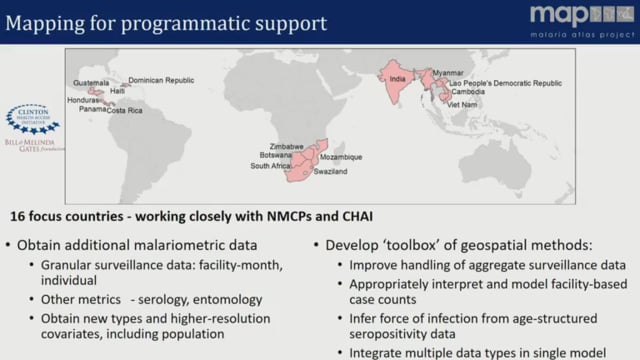Last Updated: 17/09/2025
Getting to Zero: Satellite informed system to support elimination of malaria in the Americas (SISTEMA)
Objectives
The primary goal of this project is to develop a Satellite Informed System To support Elimination of Malaria in the Americas (SISTEMA) to perform early and enhanced detection of novel malaria cases that improve the timing and spatial deployment of malaria interventions and speed progress toward malaria elimination.
The specific objectives are to:
- Develop and validate an Environmental Characterization System to characterize unique aspects of malaria ecology, independently support decision-making, and contribute to malaria elimination support models (MESM) development.
- Develop and validate MESM to improve identification of elevated malaria incidence and evaluate intervention effectiveness.
- Evaluate and operationalize a SISTEMA dashboard in end-user environments.
- Evaluate expansion of SISTEMA tools to other countries.
Global and regional disease elimination efforts significantly under-utilize the power of environmental monitoring, particularly in the context of environmentally driven diseases such as malaria. Despite decades of efforts to combat malaria, progress toward malaria elimination has stalled due to rapidly changing environmental conditions, and the integration of environmental monitoring data remains limited. In Central America and the Caribbean, nine countries have joined the Regional Malaria Elimination Initiative (RMEI) with support from key organizations. However, although understanding vector and disease ecology is critical for malaria elimination, RMEI strategies do not use environmental monitoring to inform strategic response, a crucial limitation recognized by key stakeholders.
The SISTEMA project aims to address this gap and revitalize progress toward malaria elimination by developing real-time, satellite-based tools for early and enhanced detection of new malaria cases that improve the timing and spatial deployment of malaria interventions. This project directly addresses priority topics of the NASA’s Health and Air Quality (HAQ) Area and knowledge gaps described by our primary end-user, the Clinton Health Access Initiative (CHAI), to improve public health and contribute to the elimination of one of the most important infectious diseases in human history.
Malaria Elimination Support Models (MESM) will be produced by merging various data sources, including historical malaria data, hydrometeorology, Pan-Tropical Climate Metrics, and land cover analysis. In addition, by leveraging our prior experience in malaria early warning system development, we will develop new, high-resolution Bayesian Machine Learning algorithms that generate risk metrics at the village level up to 12-20 weeks in advance, guiding the strategic deployment of active interventions to prevent onward transmission, detect cases early, and manage malaria hotspots. SISTEMA will be tested in Panama and Honduras with the support of CHAI and National Malaria Control Programs (NMCP). SISTEMA tools are anticipated to significantly enhance the operational effectiveness of malaria elimination strategies by NMCP and CHAI, ultimately expediting progress toward global malaria elimination goals.
May 2022 — May 2025


